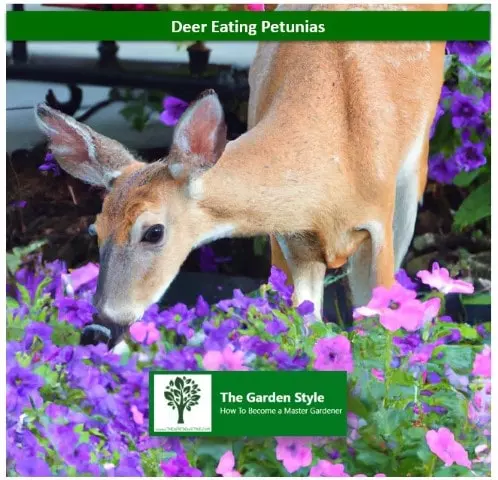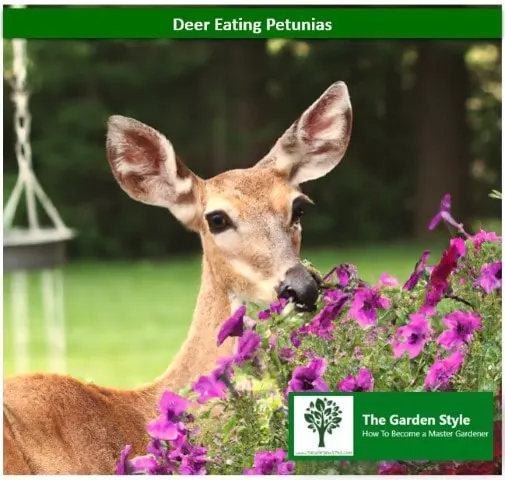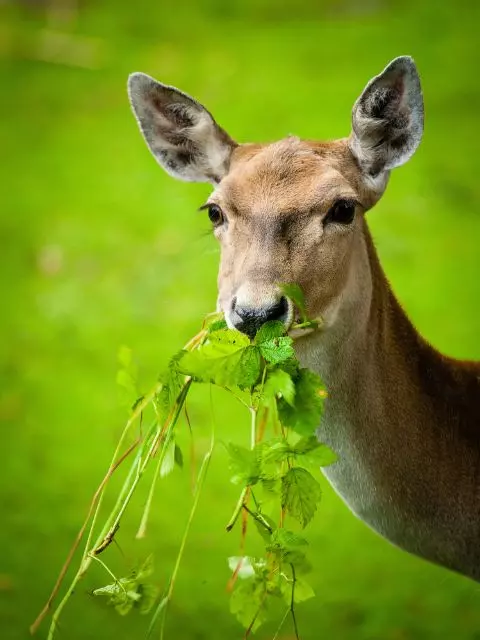Surely in your garden, you have some stunning Petunias and wonder: Do deer eat Petunias? Are Petunias deer resistant? I will clarify all your questions about Petunias and deer in this article. As you probably know from our articles, we live in an area full of trees, nature, and deer. We grow many other flowers and vegetables, such as Petunias that grow easily in our garden, and the deer come every evening to visit us. This article tells you what happens between our Petunias and the deer in our garden.
Table of Contents
Do Deer Eat Petunias?
Do Deer Eat Petunias? Yes, deer eat Petunias. Although Petunias are not a favorite plant of deer, they will eat petunias if they find them in their path. According to the Rutgers, New Jersey Agricultural Experiment Station, petunias are classified as ‘Occasionally Severely Damaged’ plants.
Although Petunias are not deer’s favorite plant, they will eat petunias if they find them in their path.
Last year we planted plants in cinder blocks and put Petunias and Zinnias. A few days later, we noticed that deer had eaten our Petunias, and we knew it was deer because we saw traces of them. Of course, we planted Petunias again, but this time we protected them.
Fortunately, there are several ways to protect Petunias from deer. In the following paragraphs, I will explain different methods to keep deer away from Petunias so that you can enjoy these beautiful flowers. In the following video you can see how I keep the deer away from my garden.
Do Deer Eat Petunia Flowers and Leaves?
What about Petunia plants? If there is no flower, will deer eat Petunia plants? Yes. People have observed deer eating petunia plants many times, even without blooming. They eat Petunias, both the flowers, and leaves, as a whole plant.
The scent of Petunia flowers will attract deer; once they taste them, they will return for the sweetness of the flowers. Deers prefer to consume moistly or have a high water content because these plants taste appealing and provide a significant amount of water.

Are Petunias Deer Resistant?
Petunias are not deer-resistant plants. While they may not be the preferred food choice for deer, hungry deer can still browse petunias if other food sources are scarce.
The University of North Carolina mentions that adult deer need 6 to 8 pounds (2.5 to 3 kg) of green feed daily for every 100 pounds (45 kg) of body mass.
Even if Petunias are not the preferred food of deer, they will eat them if they are hungry for lack of food.
Suppose you live in an area with a significant deer population and want to protect your petunias from being eaten. In that case, it is advisable to use deer-resistant fencing and repellents or consider planting deer-resistant species instead.

Will Petunias Grow Back After Deer Eat Them?
If deer eat Petunias in your garden, they can recover and regrow when the damage is not severe. The plants can often recover and grow if the deer have only grazed or nibbled on the foliage or flowers. However, suppose the deer have completely consumed the plants or severely damaged the stems. In that case, it may be more challenging for the petunias to recover.
It is essential to ensure that the remaining plant receives proper care to increase the chances of regrowth. This includes providing adequate water, sunlight, and nutrients. Additionally, protecting the plants from further deer browsing with deterrents or fencing can help prevent additional damage and aid in their recovery.
Remember that individual plant responses can vary, and the extent of damage will influence the plant’s ability to bounce back. Monitoring the condition of the petunias and providing suitable care will give them the best chance of regrowth.
Protect Petunias and Keep Deer Out
There are several ways to protect Petunias and keep deer away from these beautiful flowers. The intention is to scare or repel deer from eating the Petunias. The methods I will mention below are very effective and not at all difficult to implement in any garden.
Motion-Activated Sprinkler: Using a motion-activated water sprinkler is my favorite method of keeping deer away from Petunias and other plants that deer eat. These sprinklers are inexpensive and very durable. Some models use batteries; others include a small solar panel. When a deer (or other animal) approaches your Petunia plants, it will spray water and scare the deer away without harming it.
- PEST CONTROL ENGINEERED TO WORK- The Solar Jet Sprayer Device Provides Dependable 24/7 Defense Against Deer, Rabbits, Foxes, Squirrels, Skunks, Raccoons, Birds, Bears, Cats, Dogs, Rodents & Other Outdoor Lawn, Yard, Plant & Garden Threats
- POWERFUL JET STREAM DETERRENT- Unit Easily Stakes Into Ground & Hooks Into Any Standard Hose Via Quick-Fit Connection | When Movement is Detected, Sprinkler Shoots Water While Making a Clicking Noise, Scaring Animals Away From the Area
- URABLE METAL STAKE- Metal Stake allows for easy ground placement and durability. UNIQUE "SPRINKLER ONLY" OPTION- Device can be used to simply sprinkler your garden when not in need of animal deterrence.
Companion planting: Interplant Petunias with strong-smelling herbs or flowers that deter deer. The University of Georgia recommends planting marigolds, garlic, lavender, daffodils, and chives with scents that can help repel deer. This method works by masking the aroma of the Petunias and making them less attractive to deer.
Repellents: Apply deer repellents to your Petunias and surrounding areas. Various types of repellents are available, including scent-based ones that emit odors deer find unpleasant. Follow the instructions on the product for application frequency and reapplication after rain.
Fencing: Install a sturdy fence around your garden or flower beds. The fence should be at least 8 feet (2.4 m) tall to deter deer from jumping over. Use wire mesh or deer netting with small openings to prevent deer from squeezing through.
Motion-activated deterrents: Install motion-activated devices that produce sudden noises or flashing lights. These deterrents startle deer and discourage them from approaching your Petunias. These devices are very similar to the motion-activated water sprinkler but without water use.
Remember that deer behavior can vary, and no method is foolproof. Using a combination of strategies will provide the best protection for your Petunias and minimize the chances of deer eating Petunias.

Final Conclusions
Do Deer Eat Petunias? They eat Petunias, flowers, and leaves even when the plant is not flowering. However, Petunias are not the preferred food of deer. They will eat them if they are in their path. It would be best if you used some of the methods mentioned above to protect Petunias from deer.
Are Petunias Deer Resistant? No, Petunias are not deer resistant. You will need to protect the Petunias in your garden to prevent deer from eating or damaging all of your Petunias.
I hope you found this article useful and that you will be able to protect your Petunias from deer. I recommend you read our articles:

